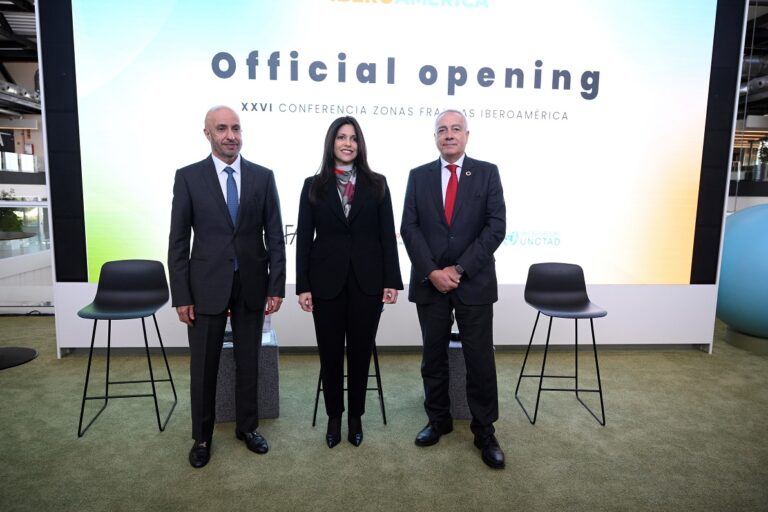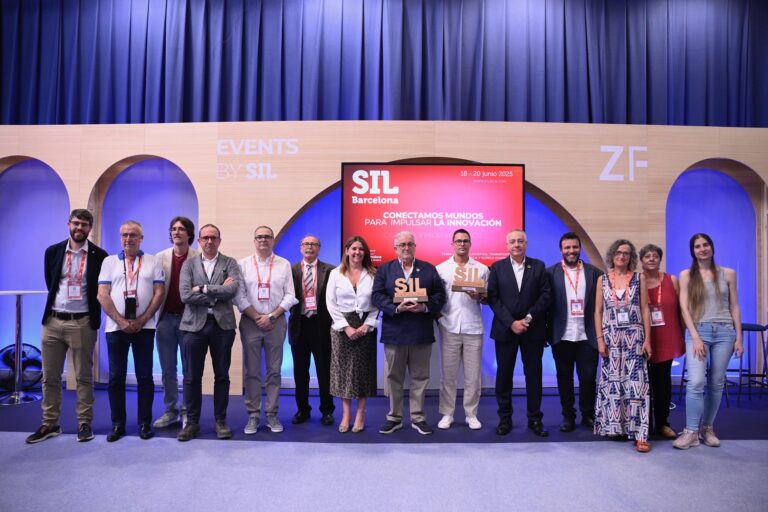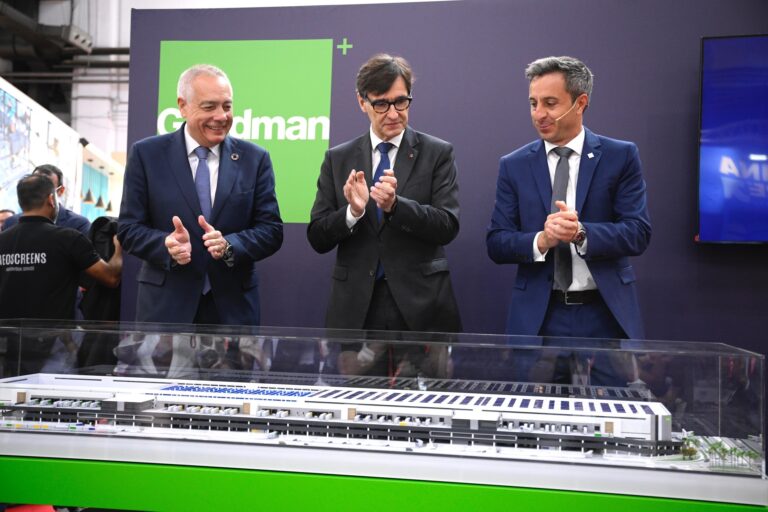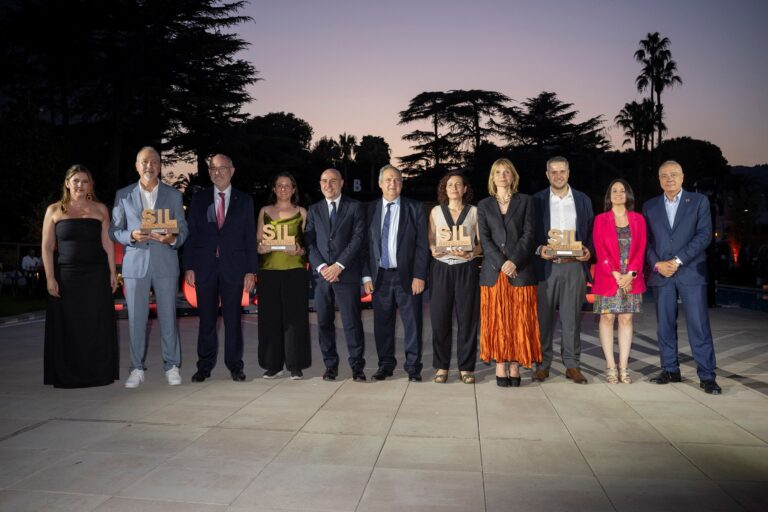The XXVI Conference of Ibero-American Free Trade Zones, the largest event in the sector worldwide, gets underway in Barcelona

9 de November de 2023
- The opening ceremony of the XXVI Conference of Ibero-American Free Trade Zones was attended by Claudia Pellerano, president of AZFA; Pere Navarro, special delegate of the State in the Consorci de la Zona Franca de Barcelona and Mohammed Al Zarooni, President of the World Free Zones Organization
- DFactory Barcelona hosts this new edition of the Conference Ibero-American Free Trade Zones, which aims to consolidate free zones as essential economic axes for the development of regions and the world economy
Barcelona, November 8, 2023.- The 26th edition of the Conference Ibero-American Free Trade Zones, promoted by the Association of Free Zones of the Americas (AZFA) and the Consorci de la Zona Franca de Barcelona (CZFB), with the collaboration of the United Nations Conference on Trade and Development (UNCTAD) and the Global Alliance of Special Economic Zones (GASEZ), kicked off today at DFactory Barcelona, the technology hub led and promoted by the CZFB.
The XXVI Conference Ibero-American Free Trade Zones offers more than 10 top-level sessions, which will have the participation of 38 international speakers from around 26 countries around the world. Thus, more than 200 professionals, operators, public entities, investors, consultants and suppliers of the free zone industry from Latin America, Europe and Africa will meet to analyse and discuss issues related to the current situation, advances, innovations, best practices, trends and future challenges in the context of export processing zones.
Opening ceremony of the 26th edition
The XXVI Conference Ibero-American Free Trade Zones began at 9:30 a.m. with an opening ceremony attended by Claudia Pellerano, president of the Association of Free Zones of the Americas (AZFA); Pere Navarro, special delegate of the State in the Consorci de la Zona Franca de Barcelona (CZFB) and Mohammed Al Zarooni, President of the World Free Zones Organization (WFZO).
Pere Navarro, special delegate of the State to the CZFB, opened the conference by explaining that: “The CZFB is oriented to the world, especially to the Mediterranean and Atlantic world. We have a very good relationship with Latin America, which is based on common interests, participation in events and political alliances, governance, business opportunities… we are very pleased that they have decided to celebrate this day here today at DFactory Barcelona”.
In his turn, Mohammed Al Zarooni, president of the WFZO, affirmed that “together with the Ibero-American Free Trade Zones we are creating new opportunities and new partnerships for the sector. Collaborations that help promote and advance regional economies and global economic development”.
Claudia Pellerano, president of AZFA, closed the official inauguration by stating that “free trade zones are economic spaces dedicated to generating employment and then to creating jobs that contribute to education and sustainability; in attracting foreign investment that helps to sow the seed that is replicated in the transfer of technology and education. We are part of an ecosystem that must contribute beyond our factories to the sustainable development of the region”.
Free trade zones as axes of change
The main session of this first day was ‘Showcase: Free Trade Zones as axes of change’, where four Free Trade Zones that are driving change for their regions, their communities and their economic, social and environmental development were presented.
The first case is Campuslands, presented by Andrea Serrano, general manager of the Santander Free Trade Zone in Colombia. Serrano stressed that “Campuslands is a training model for young exporters of digital talent, who in 10 months get training in a technological field, at a lower cost for companies and with 100% employability at the end of the course. The programme is focused on young people without resources, mothers who are heads of household, young people with disabilities from public schools and covering 80% of the basic strata of the social pyramid in Colombia“. He ended his presentation by stressing that its purpose is “to create the D stratum, a new digital social stratum, with a higher monthly income and which will mean a generational change in its social scale in just 5 years. In this first edition we have trained 120 people, with the forecast of reaching 1000 every year. In this way, we want to close the gap in the number of programmers in Latin America“.
The second example was La Lima Free Zone & Business Park, presented by Fernando Carazo, general manager of the La Lima Free Zone in Costa Rica. It is a modern industrial park and business centre that began operating in December 2014. An environmentally sustainable project, it aims to generate jobs and opportunities for society. For example, it has a robotics programme for local schools and a Community Computer Centre operated by the local association that trains members of local communities in basic computer skills. According to Carazo, the free trade zone is “an engine of change in different aspects: social mobility, sustainable mobility, environmental and energy efficiency and the closing of educational gaps through the Actualiza Programme, an alliance that has an impact on more than 11,000 children per year“, among other programmes.
Juan Carlos Botero, General Manager of the Pacific Free Trade Zone of Colombia, presented the third case dedicated to the Pacific Free Trade Zone, understood as an axis of change and sustainable development. This is dedicated to the diversification of sectors and multi-sector exports. As Botero explained, “the private industrial park has clusters of textiles, agroindustry, pharmaceutical, food, biosecurity, graphic printing companies… with exports to more than 68 countries of more than 250 different references/products. The Pacific Free Trade Zone is an example of economic development, sustainable development and social contribution“.
Finally, the case of the Cadiz Free Trade Zone and its Incubazul project, understood as the blue economy hub of Spain, was presented. Francisco González, special delegate of the State in the Cadiz Free Trade Zone Consortium, explained that “the Consorci is one of the main economic drivers of the province, and we create a new industrial model aligned with sustainable mobility, care for the environment, use of renewable energies and the optimisation of infrastructures, based on the blue economy. After analysing everything we have, such as port logistics and maritime transport, marine resources, biotechnology, tourism linked to the sea, innovation… we created the Incubazul project, a project that aims to be a benchmark in the Blue Economy throughout Spain and in which circumstances are created to attract and promote talent and ideas with the main focus on the seas and oceans“.
This afternoon at 5:30 p.m., the closing ceremony of the AZFA event will be held at DFactory Barcelona, with the participation of Jaume Collboni, Mayor of Barcelona, and Claudia Pellerano, president of the AZFA.
Conference organized by GASEZ
Tomorrow, 9 November, the GASEZ Conference will be opened by Claudia Pellerano, President of AZFA; James Zhan, Director of UNCTAD and Co-Chair of GASEZ; Samir Hamrouni, CEO of the WFZO; and Blanca Sorigué, Director General of the CZFB. In addition, two main panels during the day will focus on initiatives to recognise model zones related to the Sustainable Development Goals, as well as emerging issues impacting the Economic Zones community.
On Friday 10 November, conference attendees will have the opportunity to visit the Barcelona Super Computing Center, Iberdrola’s green hydrogen plant in the Zona Franca and the Logistics 4.0 Incubator. Throughout the conference, the event facilitates high-quality networking between attendees and companies, startups and enterprises leading projects and innovations related to the free zone sector, as well as getting to know the entrepreneurial ecosystem of the Zona Franca de Barcelona, the unique logistics enclave in southern Europe.



